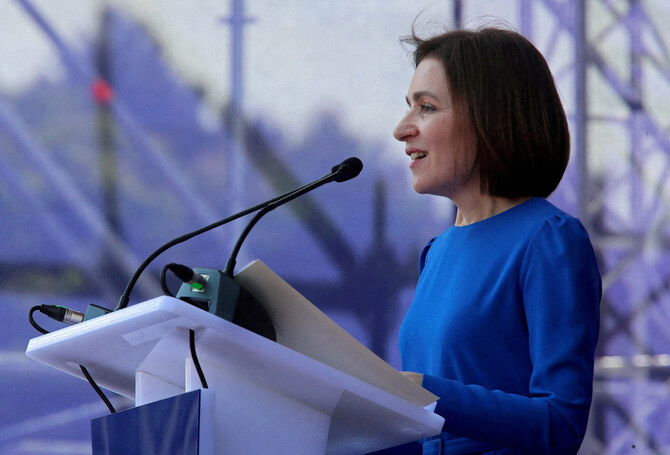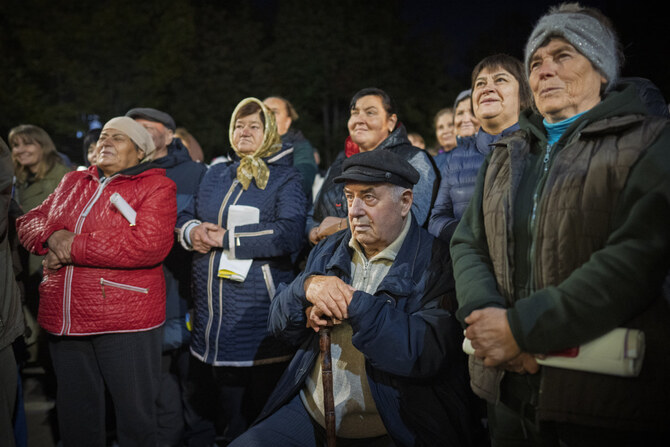CHISINAU: Moldovans vote on Sunday in a presidential election and a referendum on joining the European Union, with fears of Russian meddling in the two key electoral tests amid the war in neighboring Ukraine.
The elections are a litmus test of the former Soviet republic’s pro-European turn under incumbent President Maia Sandu, who is seeking a second term in the country of 2.6 million.
Police have made hundreds of arrests after discovering a massive vote-buying scheme, warning this week that up to a quarter of the ballots cast could be tainted by Russian cash.
“Our country is at a crossroads... A group of thieves are trying to deceive people, promise them money, give them false information,” Prime Minister Dorin Recean said, urging Moldovans “to be vigilant.”
Sandu, who beat a Moscow-backed incumbent in 2020, cut ties with Moscow and applied for Moldova to join the EU following Russia’s invasion of Ukraine in 2022.
She has repeatedly sounded the alarm on Russian efforts to interfere in the vote — a claim Moscow has rejected.
Washington also issued a fresh warning this week, while the EU passed new sanctions on several Moldovans.
Sandu, 52, a former World Bank economist, is the clear favorite in the race.
But with only 35.8 percent of voter support, she is predicted to fall short of the majority needed to avoid a second round on November 3, according to the latest polls by the WatchDog think tank.
Her 10 competitors include Alexandr Stoianoglo, a 57-year-old former prosecutor supported by the pro-Russian Socialists, who is polling at nine percent.
Renato Usatii, a 45-year-old former mayor of Moldova’s second largest city of Balti, is predicted to win 6.4 percent.
Polls open at 7:00 am (0400 GMT) and close at 9:00 pm, with partial results expected from around 10:00 pm.
For the referendum, 55.1 percent of those surveyed have said they would vote “yes,” while 34.5 percent said they were set on “no.”
The referendum asks if the constitution should be modified to include joining the EU as an objective. The 27-member bloc began membership talks with Chisinau this June.
For any result to be valid, participation must reach at least 33 percent. Some pro-Russian parties have campaigned for a boycott.
“The future of Moldova will depend on what the people will choose... I hope we will take firm steps toward the European Union,” accountant Lidia Ceban said.
Sandu has been touring the country to say that joining the EU will help improve life in one of Europe’s poorest nations.
“The fate of our country, for many decades to come, rests on this (Sunday’s) decision,” Sandu said at a campaign event.
Sandu’s critics say she has not done enough to fight inflation and reform the judiciary.
In his campaign, Stoianoglo — who was fired as prosecutor by Sandu — has called for the “restoration of justice,” while Usatii has said he is the best choice as he is “the only one who is not controlled either by the East or the West.”
Fears of Russian interference are looming large.
Millions of dollars from Russia to corrupt voters were funnelled into the country by people affiliated to Ilan Shor, a fugitive businessman and former politician, police said earlier this month.
The “unprecedented” scheme could taint up to 300,000 ballots, according to police.
Convicted in absentia last year for fraud, Shor regularly accuses Moldova of being a “police state” and the West’s “obedient puppet.”
“Russia is hard at work. They have never (before) put in so much money,” Romanian historian Armand Gosu, who specializes in Russia and the former Soviet space, told AFP.
In addition to the vote buying, hundreds of young people were found to have been trained in Russia and the Balkans to create “mass disorder” in Moldova, including in tactics to provoke law enforcement, according to police.


























